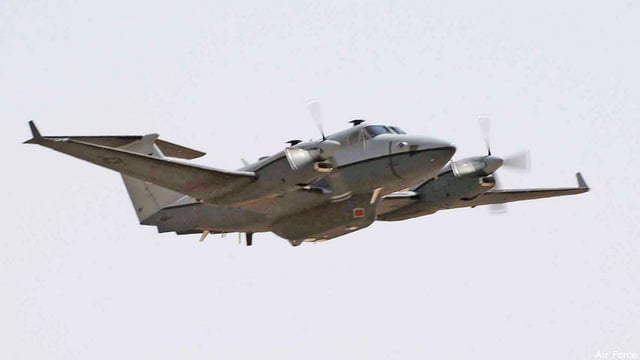Hawker Beechcraft Chairman Rebuffs Security Concerns Over Sale To Chinese: EXCLUSIVE
Posted on

The proposed sale of bankrupt Hawker Beechcraft to a Chinese company will create no security problems for the US military, pledged Hawker chairman Bill Boisture in an exclusive interview with Breaking Defense.
If the potential $1.8 billion sale to Superior Aviation Beijing actually goes through — and at least one well-regarded industry observer, Richard Aboulafia, thinks it is just a “stalking horse” for a sale to a US company — then Hawker will take three steps to insulate its military programs:
1) The Hawker Beechcraft Defense Company (HBDC), a subsidiary that builds the T-6 Texan II trainer for the Air Force, Navy, and international customers — and which is offering a ground-attack variant, the AT-6, in the deeply troubled Light Air Support competition — will be carved out from Hawker before the sale and spun off as a separate company, as has been previously reported.
2) Hawker’s “after-market” operations to maintain and sustain aircraft it has already sold to the military will be transferred from its customer-support subsidiary to become part of the new, independent HDBC. “The Chinese never intend, nor will they ever be allowed, to control or direct the defense company,” Boisture said. “This is the same defense company that’s been building airplanes for the Air Force and the Navy and air forces around the world for the last 15 years. It’s not owned by the Chinese and it can’t be and there’s no agreement that says it ever has a chance of being.”
3) However, Superior Aviation Beijing will take over Hawker’s King Air operation, which builds propeller planes for both commercial and military buyers. That includes both the C-12 Huron transport and its highly sensitive “special mission,” variants, like the RC-12 Guardrail for signals intelligence and the MC-12 Liberty for reconnaissance. But Hawker neither makes nor installs any classified electronics on these planes, Boisture said: It just builds a ready-to-customize airframe that both commercial and military customers can kit out as they wish.
(Any sale to a “foreign person” of a US firm doing national security work must be reviewed by the Treasury-led interagency Committee on Foreign Investment in the United States, CFIUS).
Are these protections enough? Robbin Laird and Ed Timperlake of the website Second Line of Defense, who are also frequent contributors to Breaking Defense, thought not. “You have to modify the airframe,” often extensively, to take the classified electronics, Laird told Breaking Defense. On a plane as complex and highly classified as the MC-12, he went on, “the interaction between the aircraft and the mission system is significant” — and the necessary back-and-forth over how to modify the airframe can reveal clues about what kinds of capabilities are being installed.
The first MC-12s, though, were actually modified from second-hand King Airs bought by L-3, without direct involvement from Hawker, Boisture said. And since then, Hawker has developed a specific variant of the King Air for special mission customers, built without the usual complement of passenger seats but with additional fittings for extra fuel tanks, electronics, and so on. Those modifications accommodate a wide range of special-mission equipment, not just for the military but for commercial customers as well. So there’s no need for any back-and-forth exchange of information about how to fit specific, sensitive systems on the aircraft, Boisture said: Hawker — or Superior Aviation Beijing — simply sells the empty plane and walks away.
“We are not the payload integrator and have not been,” said Boisture. “Superior will not have a business relationship with those integrators: They’ve always done that on their own anyway, so they’ll continue to do that on their own.”
“He’s exactly right,” agreed Teal Group analyst Richard Aboulafia. “The thing that makes Hawker Beechcraft aircraft effective special mission platforms has nothing to do with Hawker Beechcraft…. They build a good platform,” he said, but that’s just the body: “The soul come from someone else.”
Laird remains suspicious of Superior: “No Chinese air company is owned by anybody but the PLA [People’s Liberation Army]. We’re not supposed to say that but it’s the truth,” he said. “Anybody’s who’s played this game, Eurocopter [for example], they get burned.”
Aboulafia, however, doubts that Superior has such shady connections — or, for that matter, even the financial backing to close the Hawker deal in the first place. “The company doesn’t have a website, come on,” he told Breaking Defense. “Will they be able to get $1.8 billion in cash? It’s possible.” Superior is 40 percent owned by the Beijing municipal government, but that’s not exactly the PLA or State Security, nor is the city’s financial commitment clear. The other 60 percent is owned by entrepreneur Shenzong Cheng and his wife, Qin Wang, but all they’ve done in the aviation business is spend the last six years buying up bankrupt companies worth a fraction of Hawker Beechcraft — the total value is less than $30 million — and then invest little in rebuilding them.
So, Aboulafia said, “I just don’t believe that the sale is going to happen…. The primary role of this purchase — this purported purchase — may just be to set a high price for other possible bidders.”
Whether the Superior deal is sealed or not, Aboulafia went on, the bankruptcy process has already damaged Hawker’s defense business: Hawker is counting on international exports of its T-6 trainer to pick up as US sales wind down, but rivals like Brazil’s Embraer and Switzerland’s Pilatus have exploited the uncertainty over Hawker’s fate to snap up market share in Latin America, the Middle East, and Asia. That puts even more pressure on Hawker to open new markets with its ground-attack variant, the AT-6, and raises the stakes still further for the Air Force’s bitterly contested Light Air Support contract.
Subscribe to our newsletter
Promotions, new products and sales. Directly to your inbox.
